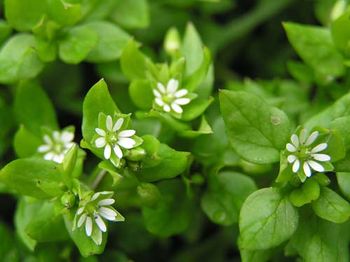Chickweed
Other Names: Stelleria media, Adder’s mouth, alsine, chick wittles, chickenmeat, clucken wort, common chickweed, hashishat al qazzaz, passerina, satinflower, sercedili, skirt buttons, star chickweed, starweed, starwort, stitchwort, tongue grass, Vogelmiere, Gewöhnliche Vogelmiere, vogelmuur, Vogel-Sternmiere, white bird’s wye, winterweed, Stellaire intermédiaire, Morgeline, Capiquí, pamplina o hierba gallinera, 繁缕
Chickweed is native to Europe and Asia, and is now found throughout the world. It is a common hardy plant that easily grows in cropland and fallow fields, lawns and gardens, areas adjacent to buildings, and in waste areas. Chickweed (Stelleria media) contains a succulent flavor that enhances raw vegetable salads. The aerial parts and root are used to make medicine.
Special Precautions of Chickweed
- Chickweed may cause contact dermatitis and people with allergies to the daisy plant family could also react to chickweed.
- Chickweed is usually considered a safe herb but it should not be used by pregnant or nursing women without consulting a professional health care provider.
- Contains plant chemicals known as saponins, which can be toxic to some species when consumed in large quantities. Chickweed has been known to cause saponin poisoning in cattle. However, as the animal must consume several kilos of chickweed in order to reach a toxic level, such deaths are extremely rare.
- Before flowering, it would be easy to confuse chickweed with scarlet pimpernel (Anagallis arvensis), a slightly toxic Primulaceae (due to its high content of haemolytic saponins), at least in its raw state, which grows very frequently in gardens,
The benefits of Chickweed are
Chickweed (Stellaria media) is high in vitamin C, beta carotene, and minerals such as iron, calcium, magnesium, and manganese. Herbalists have found that chickweed is effective in treating hemorrhoids, eczema, and other irritating skin conditions.
- Chickweed may be useful in the treatment of eczema, though scientific data is lacking : One report published by the University of Maryland Medical Center suggests using chickweed as an herbal supplement in the treatment of eczema. In this report, chamomile was seen to have the most medical literature backing up the herb for the relief of eczema and itching. However, the university did mention that though scientific data is lacking, there is some support for the use of chickweed as either a salve or in an ointment for eczema as well.
- Chickweed is used by traditional herbalists for hemorrhoids : Dr. John Ray Christopher, one of the greatest master herbalists of the twentieth century, used chickweed as a remedy for hemorrhoids. Dr. Christopher explained that hemorrhoids were caused by eating too much sugar in the form of candy, pastries, soft drinks, bread, and coffee drinks. The sugar leaches out calcium from the body, as does alcohol, tobacco products, and any product containing white flour. One of the first places to become weak when calcium is leached out is the cardiovascular system. Dr. Christopher noted that when fecal matter sits in the descending colon and rectum for too long due to constipation, the sugar in the stool eats away the walls of the rectum. The weakened blood vessels in the rectum then form painful hemorrhoids. Two or three warm sitz baths a day made with chickweed tea (decoction) followed by an application of chickweed ointment was said to bring relief from hemorrhoids.
- Chickweed has been found to have antioxidant and anti-cancer properties : While there are not many scientific studies available on chickweed, the studies that are available are encouraging. One medical study published in the March 2009 issue of Plant Foods for Human Nutrition studied the anti-oxidant levels of the vegetable sprouts in Korean salads. Chickweed sprouts were among the eleven plants tested. The methanol levels in Stellaria aquatica, a close relative of Stellaria media, had the highest anti-cancer properties of all of the vegetables tested for certain kinds of cancer. Antioxidant properties were observed in all of the plants. The conclusion of the study was that the sprouted salad vegetables could definitely be used as a supplement to treat cancer.
- Taken internally as a tea or tincture, chickweed has a reputation as a treatment for rheumatism and an infusion of the fresh or dried leaves added to bath water is thought to reduce inflammation caused by rheumatic pain.
- A poultice of the crushed leaves has been used traditionally to relieve any kind of roseola and is thought to be effective where there are fragile superficial veins.
- Taken internally in small quantities as a decoction, chickweed is considered a treatment for constipation, kidney complaints and quick relief of pain in the digestive system.
- Chickweed decoction has been used in traditional herbal medicine to treat cystitis and other related urinary tract inflammations.
- Chickweed is used as a detoxification agent and is considered to be as effective as herbs such as burdock root for its blood cleansing abilities.
- A decoction of the fresh aerial parts is a traditional treatment for relief from extreme physical fatigue and debilitation.
